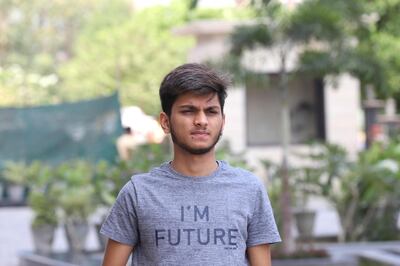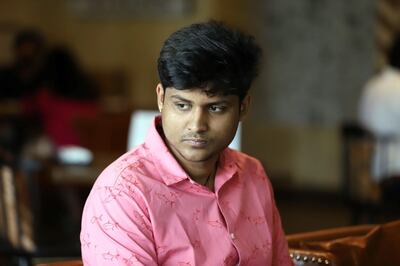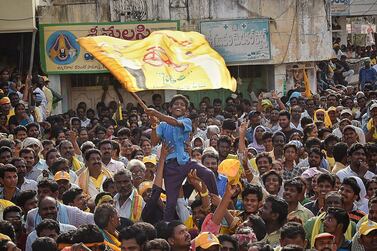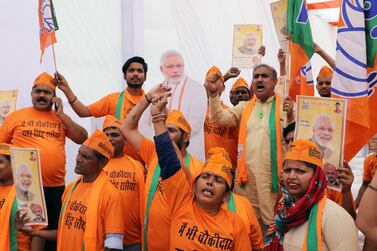India’s first-time voters say they feel let down by Prime Minister Narendra Modi and the rise of Hindu nationalism as the country heads to the polls on Thursday.
Voting will begin for the first of seven phases in the Indian general election, with the polling set to continue until May 19.
From an electorate of 900 million, there are 15 million first-time voters aged either 18 or 19. Yet in the northern state of Uttar Pradesh, where one of the largest number of young voters come from, unemployment among the youth is high and communal violence, mostly between Hindus and Muslims, is still a problem.
Yamaan Husain, from the state capital Lucknow, applied for his voter card the day after his 18th birthday last week. His enthusiasm to vote has been dulled, however, by his concern that religion has dominated the national discourse.
“You are born into your religion, but you are a human being – no one should be judged as different because they follow a particular religion,” said the teenager, who plans to go to university later this year to study aeronautical engineering.
“This is a secular country and it’s not right to hurt people who follow Islam as their religion.”

The ruling Bharatiya Janata Party (BJP), led by Mr Nerendra Modi, swept to power with a majority in 2014, promising economic development and the creation of millions of jobs for young Indians.
First-time voters say they admired the BJP for the pledge of a powerful India, but criticised Mr Modi for failing to condemn or rein in the right-wing groups that are accused of attacking Dalits, or low-caste Hindus, and minority Muslims.
There has been a spate of attacks on people for allegedly eating beef or slaughtering cows, an animal that is sacred to Hindus, who make up the majority of India’s 1.3 billion population.
Although eating beef is not illegal, the slaughter of cattle has been banned in some states, but for many of India’s Muslims it is an attractive low-cost protein source.
The BJP has denied links to the groups responsible for the attacks and says it does not discriminate between citizens on the basis of religion.
Uttar Pradesh is one of the worst states for cow-related violence. It also sends the highest number of politicians to the lower house of parliament, with 80 out of 552. It is India's the most populous state, with a population of more than 200 million, and therefore it plays a crucial role in Indian politics.
It is home turf for conservative Hindu voters and is often thought of as the path to the prime minister's office, with eight out of 14 previous prime ministers having connections to the state.
Grade 12 pupil Rijul Singh, 18, a classmate of Mr Husain, says the BJP is the least likely party to get his vote, but he is not keen on the rival parties either.
“When the BJP started out in government, it did good. But it is disappointing the party has done nothing to stop conflict in the country. I have not yet decided who I will vote for, but the BJP would be the last. The party that leads the country should not be biased towards one religion,” said the aspiring architect.
Instead of Modi, many first-time voters are swaying towards Akhilesh Yadav, a former chief minister of the state and head of the socialist Samajwadi Party.
“There is a lot of support for Mr Yadav because he has done good work,” said Mr Singh, and other residents speak proudly of a newly-launched metro that was his brainchild.

He is among 20 leaders who have come together to fight Mr Modi as part of ‘mahagathbandhan’, or the mega alliance. But few political experts see the alliance as having a long-term chance at survival.
Uttar Pradesh’s young voters are also sceptical about the main opposition, the Indian National Congress party, and its leader Rahul Gandhi – the grandson of Indira Gandhi. They do not see them as contenders on the national stage and say Mr Gandhi lacks the charisma of Mr Modi.
Teenager Kashish Gupta said she too looks up to Narendra Modi, but that the BJP has failed to deliver on its promises, such as improving the income of local farmers.
“I respect Mr Modi, but I feel political parties are more interested in gaining power than in governing the country,” she said.
“The BJP is propagating Hinduism way more than they should. India is a secular nation and they should look after all religions.”
But there is an option for those who cannot commit their vote to one party – in 2014, the electronic voting machines began including a ‘none of the above’ button for the first time.
“If I don’t feel right about it, I might give my vote to nobody at all. But that would be wasting my vote and that’s not what I want to do,” said Ms Gupta, who is keen to go to university to study political science.
“All I want is somebody who makes promises and then upholds them.”







